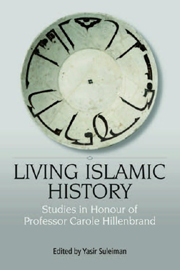Book contents
- Frontmatter
- Contents
- Acknowledgements
- Professor Carole Hillenbrand: List of Publications
- Preface
- 1 The Origin of Key Shi‘ite Thought Patterns in Islamic History
- 2 Additions to The New Islamic Dynasties
- 3 Al-Tha‘alibi's Adab al-muluk, a Local Mirror for Princes
- 4 Religious Identity, Dissimulation and Assimilation: the Ismaili Experience
- 5 Saladin's Pious Foundations in Damascus: Some New Hypotheses
- 6 The Coming of Islam to Bukhara
- 7 A Barmecide Feast: the Downfall of the Barmakids in Popular Imagination
- 8 The History of the Patriarchs of the Egyptian Church as a Source for the History of the Seljuks of Anatolia
- 9 Genealogy and Exemplary Rulership in the Tarikh-i Chingiz Khan
- 10 Vikings and Rus in Arabic Sources
- 11 Qashani and Rashid al-Din on the Seljuqs of Iran
- 12 Exile and Return: Diasporas of the Secular and Sacred Mind
- 13 Clerical Perceptions of Sufi Practices in Late Seventeenth-Century Persia, II: Al-Hurr al-‘Amili (d. 1693) and the Debate on the Permissibility of Ghina
- 14 On Sunni Sectarianism
- 15 The Violence of the Abbasid Revolution
- 16 Nationalist Poetry, Conflict and Meta-linguistic Discourse
- Bibliography
- List of Contributors
- Index
16 - Nationalist Poetry, Conflict and Meta-linguistic Discourse
Published online by Cambridge University Press: 12 September 2012
- Frontmatter
- Contents
- Acknowledgements
- Professor Carole Hillenbrand: List of Publications
- Preface
- 1 The Origin of Key Shi‘ite Thought Patterns in Islamic History
- 2 Additions to The New Islamic Dynasties
- 3 Al-Tha‘alibi's Adab al-muluk, a Local Mirror for Princes
- 4 Religious Identity, Dissimulation and Assimilation: the Ismaili Experience
- 5 Saladin's Pious Foundations in Damascus: Some New Hypotheses
- 6 The Coming of Islam to Bukhara
- 7 A Barmecide Feast: the Downfall of the Barmakids in Popular Imagination
- 8 The History of the Patriarchs of the Egyptian Church as a Source for the History of the Seljuks of Anatolia
- 9 Genealogy and Exemplary Rulership in the Tarikh-i Chingiz Khan
- 10 Vikings and Rus in Arabic Sources
- 11 Qashani and Rashid al-Din on the Seljuqs of Iran
- 12 Exile and Return: Diasporas of the Secular and Sacred Mind
- 13 Clerical Perceptions of Sufi Practices in Late Seventeenth-Century Persia, II: Al-Hurr al-‘Amili (d. 1693) and the Debate on the Permissibility of Ghina
- 14 On Sunni Sectarianism
- 15 The Violence of the Abbasid Revolution
- 16 Nationalist Poetry, Conflict and Meta-linguistic Discourse
- Bibliography
- List of Contributors
- Index
Summary
Nationalist Poetry: a Methodological Dilemma
Over the past three to four decades the study of the nation and nationalism has become the preserve of the historian, the political scientist and the sociologist. Witness the dominance of historical, political and sociological perspectives in the two popular Oxford readers on the topic by John Hutchinson and Anthony D. Smith: Nationalism (1994) and Ethnicity (1996). In constructing general theories about the historical rise and course of nationalism scholars from these backgrounds have focused on the political and socio-economic processes at work in nation formation and state building. References to culture in this work acknowledge the role of language and literary production in nation formation; attention to these areas has been allied in recent years to the burgeoning interest in the social semiotics of the nation, including its symbols and rituals, sports and tourism, cuisine and dress, museums and architecture, landscape and cartography, art and music, and ono-mastics and commemoration. The coupling of literary production with the nation in the West has, however, been predominantly associated with prose literature, particularly the novel which, following Anderson (1991) is considered the major literary genre in nation formation. In contrast, the role of poetry in the development of the nation has been assigned to the margins of nationalism as a field of enquiry, in spite of the fact that poetry in some socio-cultural contexts has played the leading role in cultural nationalism, as in pan-Arab nationalism.
- Type
- Chapter
- Information
- Living Islamic HistoryStudies in Honour of Professor Carole Hillenbrand, pp. 252 - 278Publisher: Edinburgh University PressPrint publication year: 2010



